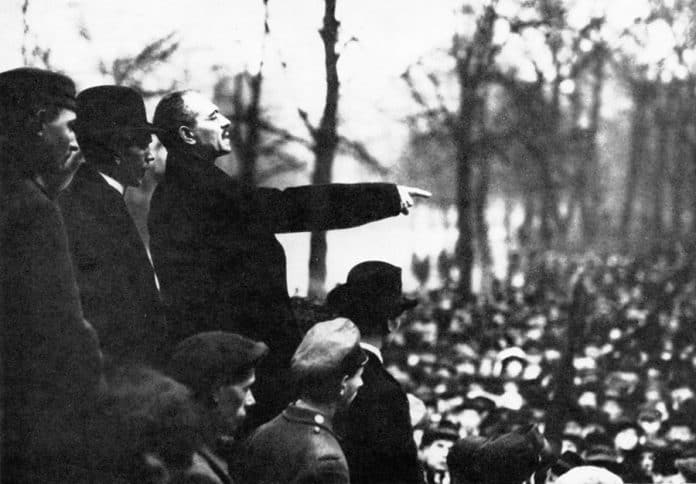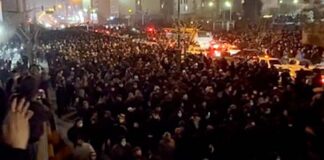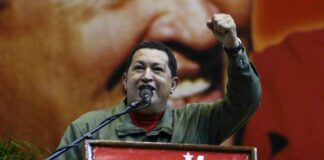Revolutions across Europe ended the First World War, writes Lachlan Marshall, as the working class rose up against the rulers that had sent them to war.
At the outbreak of the war, workers across Europe rallied to the defence of their respective nations, caught up in a tide of nationalism.
This affected even those who were declared opponents of war. The socialist Second International grouped together mass socialist parties across Europe, such as the powerful one million strong German SPD.
Prior to WWI, the International had vowed to oppose war, in the form of demonstrations and strikes to stop it going ahead.
In 1907 a major congress of the International in Stuttgart committed to call an international general strike against an impending war. It declared that the working class across Europe had a common interest in opposing war, with its manifesto at the 1912 conference at Basel issuing a call, “upon the workers of all countries to oppose the power of the international solidarity of the proletariat to capitalist imperialism.”
Such undertakings were confirmed repeatedly by the parties of the Second International, and by its largest and by far most influential affiliate, the German SPD, even as late as July 1914.
But when the war was declared in August, the SPD and most other socialist parties capitulated, lining up behind their “own” governments.
This shock turn-around didn’t come out of nowhere. Their success in building a mass party of over a million members, and a period of economic growth which had raised workers’ living standards, meant the German SPD leaders had begun to accommodate to capitalism instead of insisting on its overthrow. The full-time bureaucracy, 15,000 strong, that ran the party had built careers and a stake within the system.
The SPD’s policy of capturing power through parliament and other state institutions led their leadership to identify their interests with those of the German state, its colonies and its “civilisation”, against rival nation states.
The promised resistance to the war never materialised and instead the social democratic parties of Europe sent their millions of worker members to the slaughter. This left those within the socialist movement who continued to oppose the war extremely isolated.
But the piling up of millions of war dead, the food shortages and inflation, not to mention the political repression, began to turn mass opinion against the war and gave fresh credibility to those who continued to denounce the war as being in the service of empire and profit.
Russian Revolution
Just as in other belligerent countries, the Russian masses too were overcome with patriotic zeal at the announcement of war, interrupting a rising tide of revolutionary struggle in the pre-war years.
On the eve of WWI the number of political strikes had been soaring, culminating in the erection of barricades in Petersburg in July.
However, this ferment all but disappeared in the hysteria surrounding the war in August 1914, as militants were conscripted into the army and replaced in factories by peasants inexperienced in struggle.
This was a situation that persisted until the summer of 1915, when a new wave of strikes erupted in Petersburg, first over economic issues, but, partly as a result of Bolshevik agitation, evolved political demands: for Cossacks to leave the factories, press freedom, and the release of the five Bolshevik deputies exiled in Siberia.
The Bolshevik deputies had taken an equivocal stance on the war at first, declaring with the Mensheviks that they would “defend culture” and not taking well to the Russian Bolshevik leader Lenin’s arguments for complete opposition to the war effort. (Lenin was still in exile).
Lenin completely rejected any attachment to one’s “own” nation-state right from the beginning of the war, and argued that the defeat of one’s own government was the lesser evil, a policy that became known as “revolutionary defeatism”.
This was a strategy not just to end the war but to exploit its contradictions in order to hasten the coming of revolution.
He argued that, “A revolutionary class cannot but wish for the defeat of its government in a reactionary war, and cannot fail to see that the latter’s military reverses must facilitate its overthrow … the socialists of all the belligerent countries should express their wish that all their ‘own’ governments should be defeated.”
None of this made the revolutionaries “pacifists,” as Lenin made clear: “Not ‘peace without annexations’, but peace to the cottages, war on the palaces; peace to the proletariat and the working people, war on the bourgeoisie!”
To bring an end to the scourge of war, capitalism itself—the driver of imperialist war—had to be overthrown.
A number of groupings of Bolshevik rank-and-file workers in Russia came to the “revolutionary defeatist” position independently, often against the instinctive patriotism of some party intellectuals. This took place amid growing agitation by socialist militants in the working class against the war, as its impact on workers engendered intense bitterness.
Crucially, Russia’s capacity to prosecute the war effort was hampered by the flagging loyalty of its soldiers, whose inhumane conditions were compounded by the extreme inequality between them and their officers.
The class antagonisms throughout wider Russian society were reflected in the army; while the officers were members of landlord or bourgeois families, regular soldiers were, in Lenin’s words, “peasants or workers in uniform.” The humiliation they endured at the hands of their officers (disciplinary measures included flogging), had a clear class dynamic.
In 1915 mutinies broke out amongst sailors over their soup containing putrid meat, which led to the threat of a general strike when the mutineers were arrested.
By 1917 the oppression suffered by soldiers had reached boiling point. Of the nearly 16 million soldiers enlisted, about half had been killed, maimed, or were missing. Thus the war would become a key factor in the outbreak the Russian revolution, which broke out in February 1917.
February revolution
Following the February revolution that overthrew Tsarism, agitation surged across Russia with renewed force.
Apart from delivering the death blow to an age-old autocracy, the revolution was an overt assault on privilege; soldiers tore off their commanders’ epaulettes, deferential behaviour such as saluting was abolished and calls were made for the election of officers. One leaflet issued by socialists advised:
“Elect your own platoon commanders, company commanders, and regiment commanders, elect company committees for taking charge of food supplies. All the officers must be under the control of these company committees. Accept only those officers whom you know to be friends of the people.”
Ferment jumped between the front and the countryside like a contagion. Mass desertions meant radicalised soldiers returned to the countryside and assumed leadership of the peasant resistance. Peasant uprisings were setting fire to landlords’ manors just as mass desertions by soldiers and lynchings of intolerable officers shook the integrity of the army.
In response to this crisis on 1 March the newly-formed Petrograd Soviet decreed Order No. 1 which subjected all military activity to the authority of elected committees of workers, sailors and soldiers, in a direct challenge to the sovereignty of the Provisional government that replaced the Tsar.
The Bolsheviks’ slogan of “Bread, land and peace” spoke to this new mood, as expropriations of land in the countryside and growing hunger in the cities coincided with the disintegration of the army. Entire battalions simply refused orders, as General Alekseev admitted: “We have no army, either on the front or in the rear…all that remains is human dust.”
Over the course of 1917 Bolshevik influence amongst soldiers skyrocketed from next to nothing to a situation where, as Stankevich described, “Practically every division had its Bolshevik, with a name better known than the name of the Division Commander.”
A crucial step to ending the war was fraternisation with German soldiers, which became increasingly common, often at the initiative of Bolshevik soldiers.
Meanwhile the Provisional government that replaced the Tsar continued to expose its bankruptcy through its enduring commitment to a barbaric war and failure to divide up the landlords’ estates and give land to the peasants. All this gave credence to the Bolsheviks’ slogan of “all power to the soviets.”
In October the Bolsheviks achieved a majority in the Petrograd Soviet, the most important of the new popular committees formed by delegates from workplaces across Russia. They succeeded in overthrowing the discredited Provisional government, with the overwhelming support of the country’s workers, soldiers and peasants.
The new Bolshevik government proceeded to make good on its slogans by handing over land to the peasantry, which in any case had already occupied much of the land. The Bolsheviks took steps to deliver peace, and by March 1918 had signed the Brest-Litovsk Treaty with Germany that withdrew Russia from the war.
The world’s first workers’ state became a beacon to Europe’s workers who were tired of war, with solidarity strikes erupting across Germany when news arrived of Russia’s workers taking power. Here too it was revolution that brought an end to the war.
German revolution
The SPD’s failure to oppose the war left opponents of the war in Germany in a tiny minority. Karl Liebknecht was the lone SPD deputy in the Reichstag to vote against further war credits in December 1914.
Revolutionary socialists were eventually forced to split from the SPD, forming the Spartacus League, which would later become the German Communist Party (KPD).
Over time, with food shortages causing hunger and growing bitterness at the war, the Spartacists deepened links with militants in the working class, often by illegally distributing leaflets.
Such was the extent of anti-war feeling that when Liebknecht was imprisoned for his anti-war activities 55,000 workers came out on strike on the day of his sentencing, led by radical shop stewards in the metal industry. Most of them were not even aligned to Liebknecht’s party, but were ordinary worker members of the SPD chafing at the deprivations brought on by war.
SPD MPs began feeling the heat of this anti-war feeling, and in December 1915 another 19 deputies voted against war credits. These MPs were expelled from the party and eventually established the USPD (Independent Social Democratic Party), a centrist party that vacillated between support for the war and the strident anti-militarism of the Spartacists.
Like the situation in Russia, the millions of war dead and the horrors of the front took their toll on soldier morale. A mutiny broke out in the German navy as early as August 1917, but was quickly suppressed.
By November 1918 desire for an end to the war boiled over when sailors mutinied in Kiel and Wilhelmshafen, and the unrest spread to the towns. Mutinying soldiers made contact with workers and declared an armed mass demonstration demanding the freeing of 300 soldiers imprisoned for mutiny.
This joint march of 10,000 soldiers and workers in Kiel was fired on by a group of officers, after which fire the soldiers returned fire. From here the armed demonstration became an armed insurrection.
Prison doors were flung open and the mutineers’ comrades were freed (the imprisoned revolutionary socialist Rosa Luxemburg was released in this way by one such breakout). Mass meetings of soldiers elected representatives to soldiers’ councils—similar to the Russian soviets—which assumed sovereignty, commanding 40,000 sailors.
The city of Kiel was paralysed on 5 November by a general strike in the factories and docks. Uprisings and mutinies followed in other port towns like Hamburg, Cuxhen, Rostock and Wilhelmshafen.
Revolution reached the capital Berlin on 9 November, forcing Kaiser Wilhelm II to abdicate and hand over power to the only person with sufficient authority to rein in the masses, the SPD leader, Friedrich Ebert. He abolished the monarchy and declared the Weimar Republic. The armistice that officially ended WWI was signed two days later.
Conclusion
Wars expose the underlying class divide in society in extreme ways. Major wars throughout the 20th century have led to intense class struggles, and often the breaking of discipline in the armed forces in the form of mutinies against the military leadership.
Class struggle remains the only reliable check on governments going to war with each other. As Karl Liebknecht wrote in a leaflet in May 1915, “The main enemy of each people is at home. The main enemy of the German people is German Imperialism.” Governments and the corporations they serve launch wars to defend their own profits and privileges, yet expect working class people to do the fighting.
Today the threat of war remains very real. We have seen tensions between Russia and the US over Ukraine, and a growing stand-off between the US and China in the Pacific. The US wars in Iraq and Afghanistan killed over a million people and shattered both countries. There has been much talk of Chinese expansion representing the next “threat to world peace,” with explicit comparisons even made between Germany in 1914 and China today.
The revolutions that ended the carnage of the First World War not only embodied mass revulsion at imperialism, but also opened up the possibility of replacing the capitalist system that produces war with a socialist democracy based on grassroots workers’ and peasants’ councils.
A century after the First World War, and with the US’s “pivot to Asia” spurring geo-political tensions in east Asia, the struggle against war is intertwined with the struggle for a better world, one based on workers’ power and socialism.






